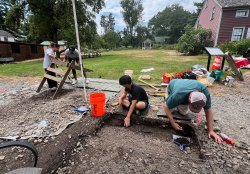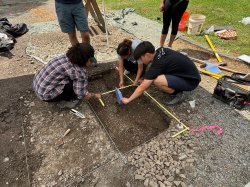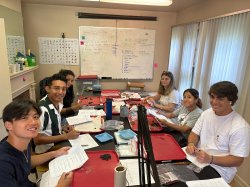Archaeology in Our Own Backyard
Posted in: Anthropology, Center for Heritage and Archaeological Studies, Homepage News and Events, Student News

This summer, Montclair undergraduate students teamed up with Dr. Christopher Matthews, professor of Anthropology, and Will Williams, Montclair alumnus and doctoral student at CUNY Graduate Center, as well as students from CUNY, Fordham University, and Hunter College to work on an extended archaeology survey of the Montclair History Center.
The Montclair History Center is listed on the National Register of Historic Places, which protects the property’s above- and below-ground cultural resources by requiring field surveys of the land any time a project is organized.
Thus, when plans to expand their parking lot and increase accessibility to the property were introduced, the Montclair History Center reached out to Montclair State University for a team to conduct the required archaeological survey prior to any construction or demolition.
2022 Excavation Project
The current excavation builds on work Matthews and Williams conducted in 2022 when they explored areas of the Orange Road campus to uncover more local history.
The exploration resulted in the discovery of the foundations of the greenhouse and floral business that once existed on the same grounds the Crane House and the Historic YWCA are now built upon. But what was possibly even more significant was the discovery of the business owner’s identity.
“Dr. Matthews and Williams have uncovered that the florist shop and greenhouse was a woman-owned business run by Alice G. Rose in 1915 at just twenty-eight years old,” says Angela Diggs, executive director of the Montclair History Center.
This was a critical addition to the long history of the property. While the physical findings reveal the stages in between the Township of Montclair’s development from a rural environment to being increasingly suburbanized, the discoveries surrounding Alice G. Rose spoke to a more rapidly changing society on the brink of the 19th amendment.
“Having a historical figure who reflects the critical social changes and the material evidence to narrate their life contributes to our understanding of who we are as a society,” says Williams.
This is a major contribution to the museum’s historical timeline as the history of the Rose family had been “unexplored prior to the work with Dr. Matthews and Williams,” says Diggs. It has since called for a reassessment of the way the Montclair History Center’s timeline is analyzed and discussed. “As historians, we must always revisit our research and narratives that we are sharing with the public.”
The specific angle to that narrative that most fascinated Allison Chacon-Perez, an Anthropology student at Montclair, was the respect finally granted to a daughter who “is often overshadowed in the historical accounts by her father.”

Summer 2024 Excavation Project
Whilst building upon those discoveries, there were layers and layers of history for the 2024 excavation team to dig through, and the process was both engaging and challenging at the Montclair History Center.
“It is a bustling environment that requires being conscious of those also moving through the space,” Williams says. “It is difficult to leave work-in-progress excavation units open for safety reasons.”
Additional work to the property over the years complicated the team’s ability to analyze the soil and what was discovered within it, but working through these challenges is instrumental in the training for aspiring archaeologists. Excavation projects as a whole are no easy task, but perhaps experiencing what archaeological work actually entails was one of the greatest takeaways.
“Copious notes, drawings, and photographs are taken along the way to ensure that the excavation process is fully documented. This is vital because archaeology is destructive,” says Matthews. “Archaeology is found more in the notes and other records than in the actual digging.”
A Rare Opportunity for Students
These experiences can be hard to come by. For Montclair students, the close vicinity of the site to Montclair State University allows for a rare opportunity to engage in field work without excessive travel.
“It’s the perfect historical archaeological training site,” says Williams. “Being able to drop into the site, leave, and return to the lab at Montclair State University allows students to try out what it means to be a historical archaeologist and opens up paths to careers in cultural resource management or academia.”

This is not lost on Chacon-Perez who understands that the ability to work in a real excavation is not something many students are afforded or can afford.
“Field schools often double as expensive study abroad programs, making them unaffordable for some students,” Chacon-Perez explains. “Despite these challenges, gaining hands-on experience is crucial as it opens up opportunities to assist on future digs and to build connections with peers in the field.”
Matthews speaks to the benefits of participating in an excavation even beyond the training itself: “Students often enjoy working with their hands and the experiential process of learning while doing the work. Sometimes the work is hard, but it is always rewarding.”
One of the most rewarding moments for Chacon-Perez was being among “the first to lay eyes on these long-buried objects.” She continues, “It is a thrilling reminder that, no matter how much the present changes, we can always learn valuable lessons from the past.”
Archaeology in Local Communities
But the students weren’t the only ones excited to see the discoveries being made. The accessibility of the Montclair History Center allowed for onlookers to watch the excavation in real time, and Williams wasn’t surprised by their curiosity.
“The discipline actively brings the past into the contemporary by making the unfamiliar relatable through tangible objects: the excavated artifacts. When this process happens within spaces where people live, work, and recreate, I believe a sense of community is strengthened by the knowledge of how these spaces came to be,” Williams explains.
For Asli Erem, an Anthropology student at Hunter College taking part in the excavation, happiness is always rooted in the “impact on the local community.” She is fascinated by the work but also feels the digging itself is a small piece of the discovery process: “There is a significant contribution in adding to a very distant part of history. I think discovering artifacts of the past is just a tiny fraction in doing what we do. Rather, we want the story of ‘what once was’ to reveal itself. Finding objects at the Montclair History Center…it is helping us understand the past.”
Even seemingly mundane objects can tell us so much about life before ours, but seeing that value in what might appear unimportant is at the core of archaeology. Discoveries such as a cobblestone walkway found buried beneath the ground, a marmalade jar, and ceramic sherds of household items speaks to how people “cognitively constructed their domestic and working spaces,” according to Williams.
“These objects may seem like innocuous material discarded once used, but they actually offer a genuine glimpse into how people understood themselves as members of society,” he says.
An Enriching Excavation
Amongst the many advances made during the 2024 excavation project, much of what remains appreciated most is the experience itself. The team of students from various schools allowed for relationships to be created and developed based on a shared passion for history, archaeology, and anthropology alongside an unmatched work ethic.
Williams appreciates having the opportunity to work with “a committed and hard-working crew” that pushed through having a difficult digging location and extreme heat and humidity while still “carrying the project to success.”
“Being back in the field with this team reinforced my respect for Montclair students,” he says. “Their work ethic was what I’d grown accustomed to from my time at the University. I felt privileged to work and learn alongside such an awesome group of people!”
Enriched from working with fellow anthropology students she wouldn’t have otherwise met, Chacon-Perez cherishes the experience surveying the property of the Montclair History Center and getting to see just how much archaeology adds to our world.
“The excavation demonstrated that there is as much, if not more, history beneath the surface as there is above it. These findings underscore the importance of preserving historical sites and highlight the crucial role of archaeology in uncovering hidden aspects of our historical narratives,” she says.
More than anything, there is truth in the work of archaeologists best summarized by Will Williams: “Unlike the written record, things don’t lie!”
Written by Sarah Ramirez
Read More
